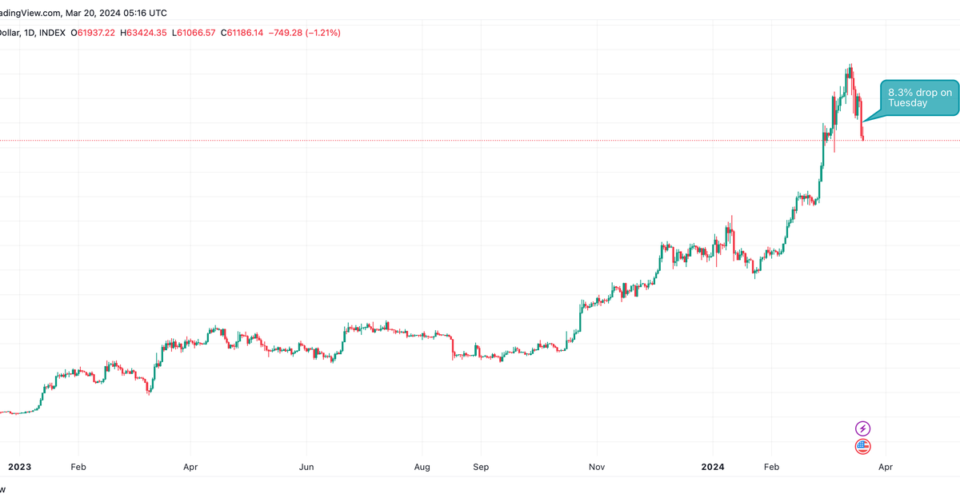Bitcoin’s (BTC) price correction gathered pace Tuesday as the U.S.-listed spot exchange-traded funds (ETFs) fell out of favor.
The leading cryptocurrency by market value fell over 8% to under $62,000, data from charting platform TradingView show. That’s the biggest single-day percentage (UTC) decline since Nov. 9, 2022. That day, prices tanked over 14% as Sam Bankman Fried’s FTX exchange, formerly the third largest, went bankrupt. The daily performance mentioned here represents the percentage gain or loss in a day, beginning at midnight UTC and concluding at 23:59:59, UTC.
Prices have pulled back 15% from record highs of over $73,500 reached last week. The CoinDesk 20 Index has pulled back 16% over the same time frame.
Bitcoin’s latest price slide has been catalyzed by several factors, including outflows from the spot ETFs, according to trader and economist Alex Kruger.
Provisional data published by investment firm Farside show that on Tuesday, there was a net outflow of $326 million from the spot ETFs, the largest on record. On Monday, Grayscale’s ETF witnessed a record outflow of $643 million.
“Reasons for the crash, in order of importance: #1 Too much leverage (funding matters). #2 ETH driving market south (market decided ETF was not passing). #3 Negative BTC ETF inflows (careful, data is T+1). #4 Solana shitcoin mania (it went too far),” Kruger said on X.
Ether (ETH), the second-largest cryptocurrency by market value, peaked at around $4,000 following last week’s Dencun upgrade and has since declined to $3,130. One reason for the slide has been the dwindling probability of the U.S. SEC greenlighting an ether spot ETF by May.
Besides, the crypto market looked overheated early this month, with long traders paying annualized funding of over 100% to keep their bullish perpetual futures bets open. Such a one-sided buildup of leverage on the bullish side often presages price corrections.
Investors will now closely watch Wednesday’s Federal Reserve rate decision, which Chairman Jerome Powell’s press conference will follow.
“This upcoming week, we will have the Fed rate decision followed by Powell’s press conference. This will give us more insight into whether the Fed is still seeing rate cuts on the horizon this year. The strong economy and higher than anticipated inflation continue to be reasons for the Fed to remain hawkish without much push-back,” Greg Magadini, director of derivatives at Amberdata, said.
Both the dollar index and the U.S. Treasury yields have recently moved higher on the back of sticky consumer price and producer price indices, denting the appeal of risk assets, including emerging technologies like cryptocurrencies.

